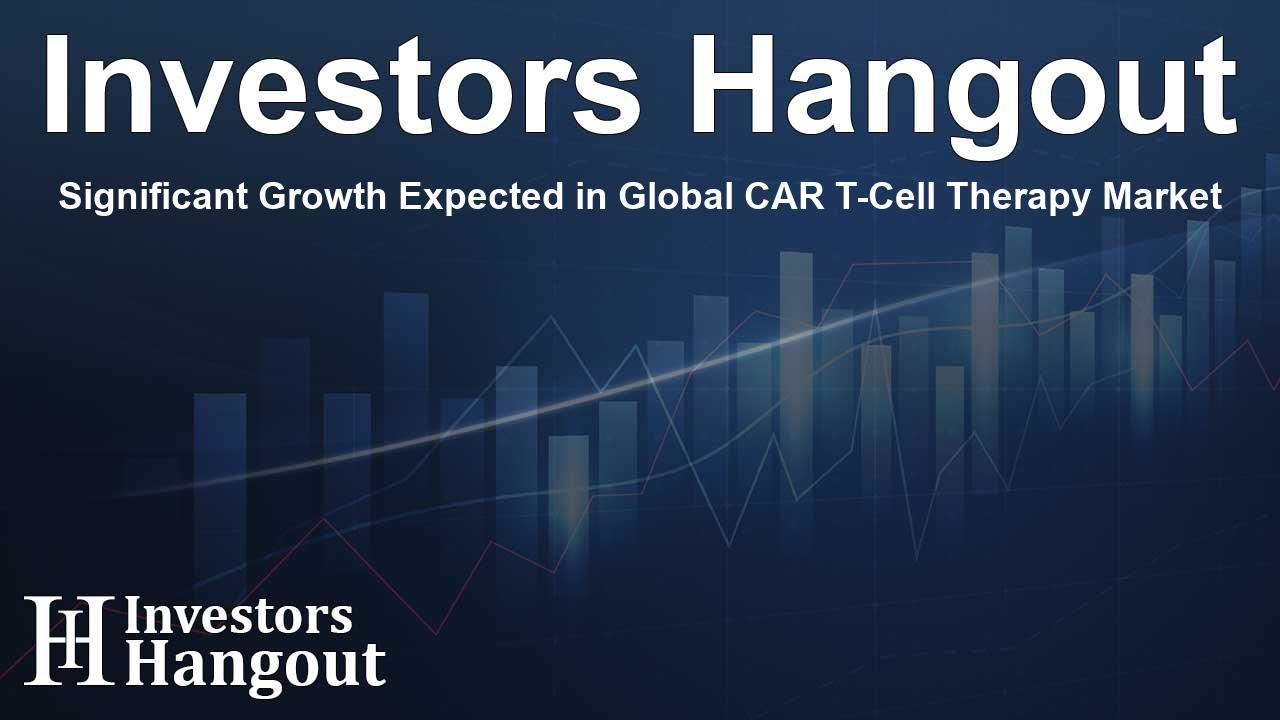Significant Growth Expected in Global CAR T-Cell Therapy Market

Rapid Growth in CAR T-Cell Therapy Market
The market for CAR T-cell therapy is on an impressive growth trajectory, blossoming from a valuation of approximately USD 3.7 billion in just 2023 to a forecasted astonishing USD 29 billion by the year 2029. This compelling shift showcases a remarkable compound annual growth rate (CAGR) of 39.6% during the forecast period. The soaring numbers reflect a convergence of various crucial elements, including the rising prevalence of cancer, significant advancements in technology, and the availability of substantial funding for research and development.
Transforming Cancer Treatment: Key Drivers
Cancer remains one of the most significant health challenges faced worldwide, with millions of new cases emerging each year. Recent estimates report nearly 20 million new diagnoses and almost 9.7 million cancer-related deaths. Alarmingly, projections indicate a staggering increase in cases, with numbers expected to surge by 77% by 2050. In this challenging landscape, CAR T-cell therapy emerges as a game-changing innovation, particularly for hematologic cancers like Diffuse Large B-Cell Lymphoma (DLBCL), which constitutes about 22% of B-cell non-Hodgkin lymphoma cases across the United States.
Market Catalysts and Challenges
The increasing incidence of cancer and the rapid advancements in genetic engineering are creating a robust demand for CAR T-cell therapies worldwide. However, accessibility to these life-saving treatments remains a significant hurdle. With treatment costs often exceeding USD 350,000 per patient, the sophisticated manufacturing processes can hinder affordability and broad acceptance. Despite these challenges, the exploration of CAR T therapies for solid tumors presents a promising opportunity, paving the way for new treatments and broader market acceptance.
Emerging Opportunities in the Market
The Asia Pacific region is projected to experience the fastest growth in the CAR T-cell therapy market between 2024 and 2029. This anticipated growth stems from increased healthcare investment and support from favorable regulatory environments, alongside a rising incidence of cancer. While North America is currently the largest market—bolstered by early technology adoption and a solid healthcare framework—developing regions represent vast growth potential in the years to come.
Prominent Players in the CAR T-Cell Landscape
The CAR T-cell therapy sector comprises several key players, including Bristol-Myers Squibb, Gilead Sciences, Novartis AG, and Johnson & Johnson. These companies have established a prominent foothold through innovative developments and strategic partnerships aimed at enhancing therapy provisions. Noteworthy mentions include:
Recent Industry Developments
1. In May 2024, the US FDA granted accelerated approval for Bristol-Myers Squibb’s BREYANZI for use in relapsed/refractory Follicular Lymphoma.
2. In April 2024, Bristol-Myers Squibb formed a global supply partnership with Cellares to scale CAR T manufacturing utilizing advanced automated methods.
3. Gilead Sciences enhanced operational efficiency with FDA approval for a manufacturing upgrade to YESCARTA, reducing the production turnaround time from 16 to 14 days.
Strategic Market Dynamics
The dominance of YESCARTA (Gilead Sciences) in terms of market share can be attributed to its early launch and consistent innovation in production processes. Moreover, CD19-targeted therapies continue to show remarkable commercial success due to their effectiveness in treating various B-cell malignancies. Hospitals currently represent the most significant consumer segment, with adult patients forming the primary demographic for CAR T-cell treatments.
Company Insights and Future Directions
1. Gilead Sciences aims to solidify its market position through continued mergers and collaborations; recent alliances point to a reliable pipeline and focused strategy in oncology.
2. Bristol-Myers Squibb’s robust investment in research and development, amounting to USD 9.3 billion in 2023, underscores its commitment to fostering innovation within the oncology landscape.
3. As a pioneer, Novartis maintains a crucial role in the market, particularly with Kymriah, the first FDA-approved CAR T therapy, playing a pivotal role in expanding treatment accessibility.
Frequently Asked Questions
What is the forecasted market size for CAR T-cell therapy by 2029?
The CAR T-cell therapy market is projected to reach approximately USD 29 billion by 2029.
What factors are driving the growth of this market?
Key drivers include increasing cancer incidence, advancements in genetic engineering, and substantial funding for research.
Which regions are expected to see the most growth in this sector?
The Asia Pacific region is expected to experience the highest growth rate in the CAR T-cell therapy market.
What are the main challenges facing the CAR T-cell therapy market?
High treatment costs and accessibility remain significant challenges for widespread adoption of CAR T-cell therapies.
Who are the leading companies in the CAR T-cell market?
Major players include Bristol-Myers Squibb, Gilead Sciences, Novartis AG, and Johnson & Johnson.
About The Author
Contact Addison Perry privately here. Or send an email with ATTN: Addison Perry as the subject to contact@investorshangout.com.
About Investors Hangout
Investors Hangout is a leading online stock forum for financial discussion and learning, offering a wide range of free tools and resources. It draws in traders of all levels, who exchange market knowledge, investigate trading tactics, and keep an eye on industry developments in real time. Featuring financial articles, stock message boards, quotes, charts, company profiles, and live news updates. Through cooperative learning and a wealth of informational resources, it helps users from novices creating their first portfolios to experts honing their techniques. Join Investors Hangout today: https://investorshangout.com/
The content of this article is based on factual, publicly available information and does not represent legal, financial, or investment advice. Investors Hangout does not offer financial advice, and the author is not a licensed financial advisor. Consult a qualified advisor before making any financial or investment decisions based on this article. This article should not be considered advice to purchase, sell, or hold any securities or other investments. If any of the material provided here is inaccurate, please contact us for corrections.
